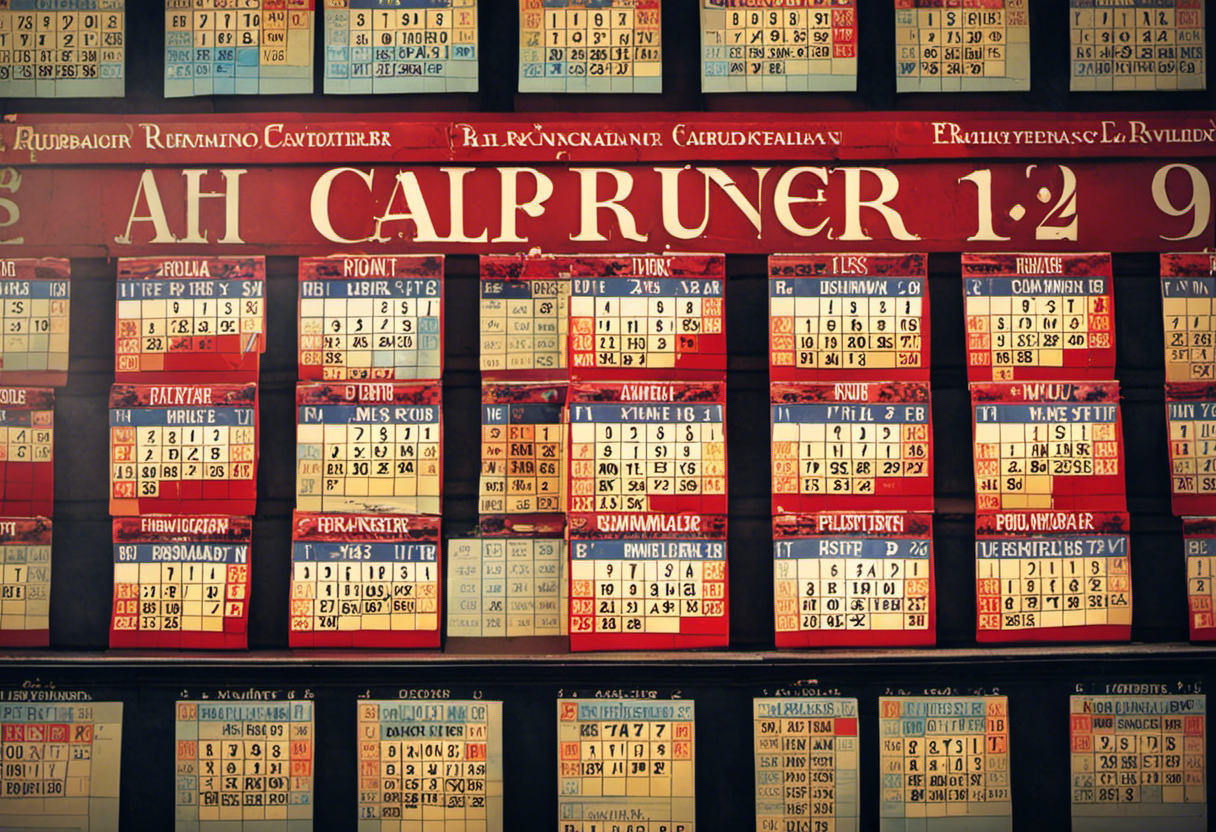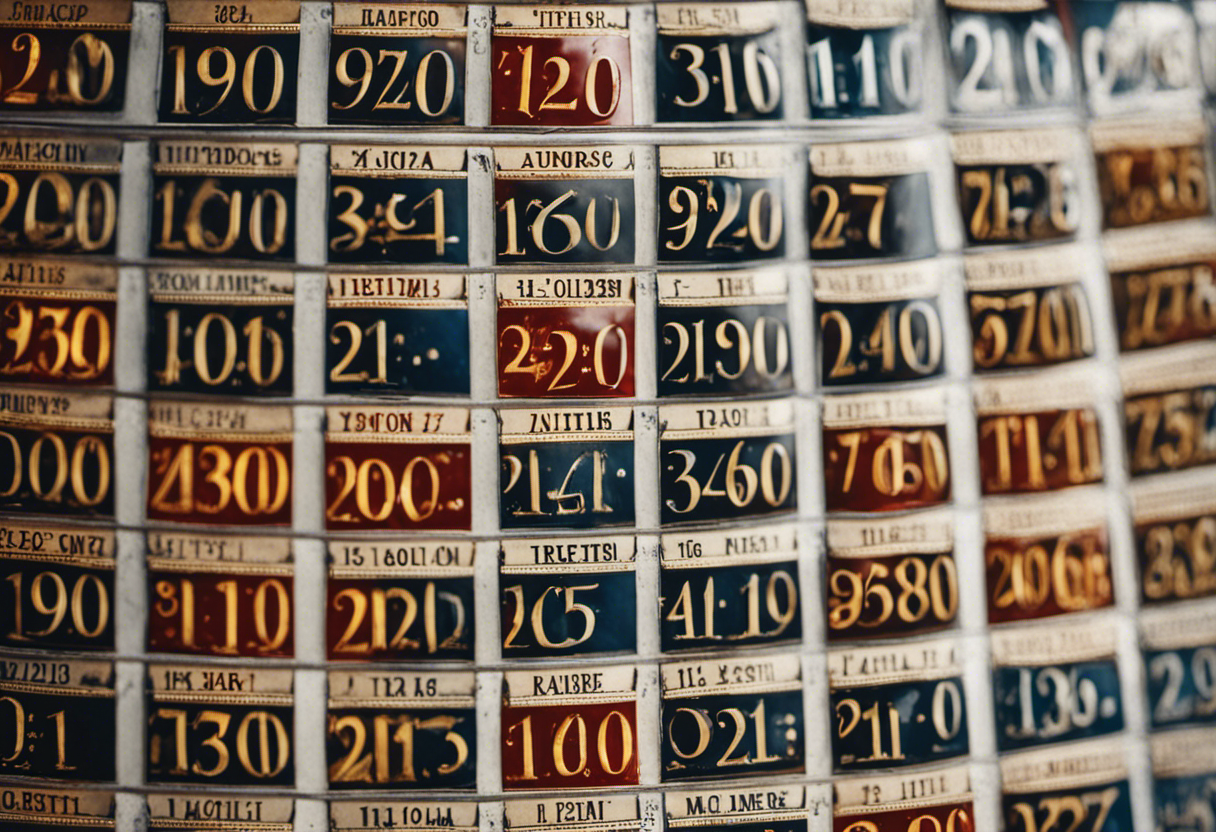In the annals of timekeeping, few calendars have been as unique and innovative as the French Republican Calendar. Born out of the revolutionary fervor of the late 18th century, this calendar sought to eradicate religious and monarchical influence while promoting a more rational and egalitarian system of time measurement.
Through its revolutionary names, decimal structure, and abolition of traditional holidays, the French Republican Calendar left an indelible mark on the history of timekeeping.
In this article, we will explore how this remarkable calendar worked and its lasting legacy.
Key Takeaways
- The French Republican Calendar was introduced during the French Revolution in 1793 as a way to break away from religious and monarchical associations.
- It was based on a decimal system with ten-day weeks and twelve months, with each month named after characteristics of the season or natural phenomena.
- The calendar faced implementation challenges such as cultural resistance to change, difficulty in relearning timekeeping, and practical challenges in synchronization with other countries.
- The calendar had a significant impact on religious observance and cultural norms, disrupting the weekly rhythm for religious communities, reducing the number of religious holidays, and challenging the influence and authority of religious institutions.
The Origins of the French Republican Calendar


The French Republican Calendar was introduced during the French Revolution in 1793, marking a significant departure from the Gregorian calendar previously used in France. The origins of the French Republican Calendar can be traced back to the desire of the revolutionaries to break away from the religious and monarchical associations of the Gregorian calendar. The development of the new calendar was seen as a way to symbolize the revolution’s ideals of reason, secularism, and equality.
The French Republican Calendar was designed by a committee of mathematicians and astronomers, including Gilbert Romme and Charles-Gilbert Romme. They sought to create a calendar that reflected the principles of the revolution and was based on rational and scientific principles. The calendar was based on a decimal system, with ten-day weeks called décades, and twelve months each consisting of three ten-day weeks. The months were given names that reflected the seasons and natural phenomena, such as Vendémiaire (vintage), Brumaire (mist), and Thermidor (heat).
Despite its origins and early development, the French Republican Calendar faced many challenges and difficulties during its implementation. These included resistance from the public, difficulties in adjusting to the new system, and the eventual decline of the revolutionary fervor that had initially supported the calendar.
Ultimately, the calendar was abandoned in 1806, when Napoleon Bonaparte reinstated the Gregorian calendar. However, the French Republican Calendar remains an interesting historical innovation, representing an important moment in the development of calendar systems.
The Structure of the French Republican Calendar


The French Republican Calendar consisted of twelve months and was organized into a decimal-based system, with each month consisting of three ten-day weeks. This structure analysis was a fundamental aspect of the calendar reform undertaken during the French Revolution. The aim was to create a more rational and efficient calendar that would break away from the traditional Gregorian calendar, which was rooted in religious and monarchical traditions.
Under the new structure, each month was given a unique name that reflected the characteristics of the season or natural phenomena occurring during that period. For example, the month of Germinal represented the germination of plants, while Fructidor symbolized the abundance of fruits.
The three ten-day weeks within each month were named Primidi, Duodi, Tridi, Quartidi, Quintidi, Sextidi, Septidi, Octidi, Nonidi, and Decadi. The last day of each month, Decadi, was designated as a day of rest and celebration, similar to the traditional concept of a Sunday in the Gregorian calendar.
This decimal-based structure brought about a more rational and uniform system for counting days and organizing time. However, despite its merits, the French Republican Calendar was ultimately abandoned in 1806, when Napoleon Bonaparte reinstated the Gregorian calendar. Nonetheless, its structure analysis and attempt at calendar reform left a lasting legacy in the history of timekeeping.
The Revolutionary Names of the Months


Each month in the French Republican Calendar was assigned a unique name that captured the essence of the revolutionary spirit and reflected the changing seasons and natural phenomena occurring during that time. These revolutionary names of the months were not only a means of organizing time but also held cultural significance, serving as a reflection of the values and ideals of the French Revolution.
- Vendémiaire: Derived from the French word ‘vendange,’ meaning grape harvest, this month symbolized the agricultural abundance of the autumn season. It represented the importance of agriculture in the new revolutionary society.
- Brumaire: Signifying the misty and foggy weather of late autumn, Brumaire highlighted the transition from the warm days of summer to the cold winter months. This name evoked the atmosphere of change and transformation that characterized the revolutionary era.
- Thermidor: Named after the Greek word ‘thermos,’ meaning heat, Thermidor marked the hottest month of the year. It represented the revolutionary terminology of passion and intensity, reflecting the fervor and energy of the French Revolution.
The revolutionary terminology used in the names of the months was a deliberate attempt to break away from the traditional religious and monarchical associations with time. By assigning names that reflected the natural world and the revolutionary spirit, the French Republican Calendar aimed to establish a new cultural identity based on the principles of the revolution.
The Decimal System of Time Measurement


The decimal system of time measurement introduced by the French Republican Calendar had several advantages.
It provided a more logical and consistent way of dividing time, making calculations and conversions easier.
However, implementing this system faced challenges.
One challenge was the need for people to adjust to a new way of measuring time.
Another challenge was the difficulty of coordinating with other countries still using the traditional time system.
Advantages of Decimal Time
One significant advantage of decimal time is its simplification of timekeeping by dividing the day into 10 hours, each consisting of 100 minutes. This system brings several benefits, including:
- Efficiency: Decimal time eliminates the need for complex calculations and conversions between different units of time. It allows for easier and faster calculations, making scheduling and time management more efficient.
- Standardization: Decimal time provides a standardized method of measuring and representing time. With the decimal system, everyone can understand and communicate time in a consistent manner, regardless of their location or background. This promotes better coordination and synchronization in various fields, such as transportation, commerce, and international communication.
- Simplicity: The decimal system of time measurement simplifies the understanding and representation of time. With a base-10 system, it becomes easier for individuals to conceptualize and visualize the passage of time, facilitating better planning and organization of daily activities.
Implementation Challenges Faced
Several significant challenges were encountered during the implementation of the decimal system of time measurement in the French Republican Calendar.
One of the main implementation obstacles was the cultural resistance to change. The French people were accustomed to the traditional way of measuring time, which followed the 24-hour cycle. The decimal system proposed a radical shift, dividing the day into ten hours, each consisting of 100 minutes. This required a complete relearning of timekeeping, which proved to be a difficult task for many.
Additionally, the decimal system faced practical challenges in terms of synchronization with other countries that still followed the traditional time measurement system. These implementation challenges, coupled with the cultural resistance, contributed to the ultimate downfall of the decimal system of time measurement in the French Republican Calendar.
The Abolition of Sundays and Religious Holidays


The abolition of Sundays and religious holidays in the French Republican Calendar had a significant impact on religious observance in France. With the removal of these traditional days of rest and worship, there was a shift in cultural norms and practices surrounding religion.
This change challenged the authority of the Catholic Church and emphasized the secular ideals of the French Revolution.
Impact on Religious Observance
Religious institutions faced significant challenges due to the abolition of Sundays and religious holidays under the French Republican Calendar. The removal of these traditional observances disrupted established religious traditions and caused societal changes. Here are three key impacts on religious observance:
- Loss of designated worship days: The elimination of Sundays as a designated day of rest and religious worship disrupted the weekly rhythm of religious communities. This forced religious institutions to find alternative ways to gather and practice their faith.
- Reduction in religious holidays: The French Republican Calendar significantly reduced the number of religious holidays. This meant that religious institutions had fewer opportunities to celebrate important events and engage with their congregations.
- Secularization of society: The abolition of Sundays and religious holidays reflected a broader trend towards secularization in French society. This challenged the influence and authority of religious institutions, as individuals and communities began to prioritize secular activities over religious observance.
Shift in Cultural Norms
With the abolition of Sundays and religious holidays, a significant shift in cultural norms occurred under the French Republican Calendar. These changes were part of a broader effort to secularize society and remove religious influences from public life.
The calendar aimed to create a new sense of national identity and unity by replacing traditional Christian holidays with new, civic celebrations. Sundays, traditionally a day of rest and religious observance, were replaced with the ‘decadi’, a day of rest that occurred every ten days.
This change disrupted established routines and cultural practices, leading to significant societal changes. People had to adjust their work schedules and adapt to a new rhythm of life.
The abolition of religious holidays also undermined the importance of religious traditions and rituals, further contributing to the cultural shifts brought about by the French Republican Calendar.
The Adaptation and Implementation Challenges


Implementing and adapting the French Republican Calendar posed numerous challenges for the French government during the revolutionary period. The transition from the Gregorian calendar to the Republican calendar required significant adjustments in various aspects of society. Some of the key challenges faced during the adaptation and implementation of the new calendar were:
- Resistance from the population: The French population was resistant to change, especially when it came to altering their traditional way of measuring time. Many people were deeply rooted in the religious and cultural significance of the Gregorian calendar, making it difficult for them to accept the new system.
- Technical difficulties: The Republican calendar introduced a decimal system of timekeeping, which required redefining the length of days, weeks, and months. This posed significant technical challenges in terms of recalibrating clocks, adjusting schedules, and ensuring synchronization across the country.
- Economic implications: The shift to a new calendar disrupted various economic activities, such as agriculture and trade, which were heavily dependent on seasonal cycles. Farmers, for example, had to adapt their planting and harvesting schedules to align with the new calendar, leading to initial disruptions in production and distribution.
The Legacy and Influence of the French Republican Calendar


Despite its eventual demise, the French Republican Calendar left a lasting legacy and exerted a significant influence on various aspects of French society. The calendar, with its decimal system and emphasis on reason and secularism, had a profound impact on cultural changes in France.
One of the most visible legacies of the Republican Calendar is the naming of the months. Many of the names chosen were closely tied to nature and agriculture, reflecting the values of the French Revolution. For example, the month of Thermidor, which fell during the hottest part of the summer, took its name from the Greek word for heat. This emphasis on nature and agriculture reflected a shift in focus towards the importance of the land and its resources.
Additionally, the Republican Calendar had a significant impact on the arts and literature. Many writers and artists of the time embraced the calendar as a symbol of the revolutionary spirit. The calendar was often featured in their works, and its themes were incorporated into their artistic expression. This influence helped shape the cultural landscape of France during the revolutionary period.
Conclusion
In conclusion, the French Republican Calendar was a revolutionary attempt to redefine time during the French Revolution. It aimed to eliminate religious and monarchical influences by introducing a new structure and names for the months.
However, the calendar faced several challenges in its adaptation and implementation, ultimately leading to its abandonment.
Despite its short-lived existence, the French Republican Calendar left a lasting legacy and continues to influence discussions on timekeeping and calendar reform.




